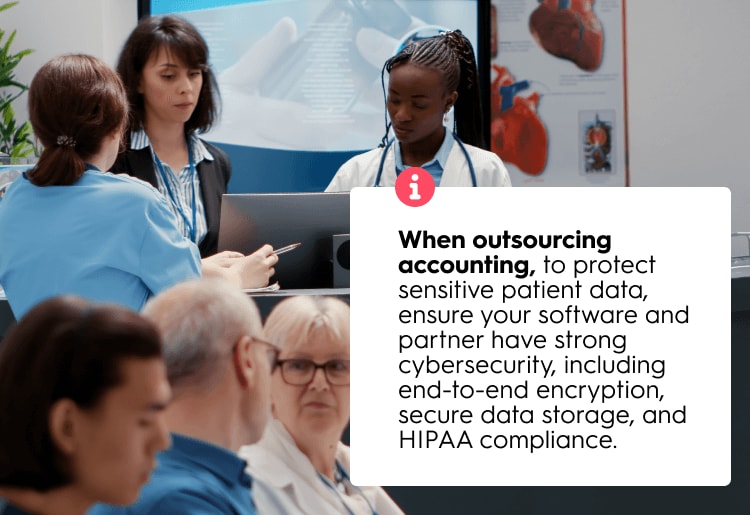However, managing accounting and financial forecasting in-house can be complex and time-consuming and requires an extensive understanding of regulatory compliance.
This is where accounting software comes into play. It offers healthcare businesses a simple but effective way to manage their accounting in-house.
Providers like Sage Accounting can significantly benefit healthcare businesses by outsourcing accounting services to an external team, freeing up time to focus on what really matters.
Top 10 Benefits of Outsourcing Healthcare Accounting Services
While healthcare companies can benefit from outsourcing their accounting services in numerous ways, here are the top 10 benefits:
1. Enhanced reporting accuracy
Accurate financial reporting is essential for healthcare providers to make informed decisions about resource allocation, budgeting, strategic planning, tax planning, and more. Outsourcing accounting tasks ensures meticulous data entry, adherence to Generally Accepted Accounting Principles (GAAP), and timely generation of financial reports.
This empowers healthcare leaders to gain a clear understanding of their financial performance and make data-driven business decisions.
2. Streamlined operations
Outsourcing complex accounting processes frees up valuable internal resources to focus on core healthcare services.
A qualified accounting provider can handle a wide range of tasks, including accounts receivable and payable management, payroll processing, tax planning and prep, financial statement preparation, and even insurance claim submissions.
This streamlines workflows reduces administrative burdens, and allows healthcare staff to focus on delivering high-quality patient care.
3. Business continuity and growth
Accountants can offer visibility into business continuity and growth by developing financial projections, estimating business continuity, and developing growth scenarios. They can also work with healthcare business owners to develop financial strategies to optimize their chances of business success and continuity.
4. Payroll management
Payroll processing for healthcare staff involves tracking payroll data, running complex calculations, withholding taxes, and adhering to labor laws.
Outsourcing payroll planning and preparation can ensure accurate and timely compensation and decrease the risk of errors and penalties associated with non-compliance.
A capable accounting provider can handle every aspect of running payroll, from data collection to remitting payroll taxes.
5. Access to financial expertise
Outsourcing your accounting to an outside firm comes with the significant benefit of access to extensive financial expertise. Utilize an accounting team with extensive experience with the intricacies of healthcare accounting, including medical coding, billing regulations, and HIPAA compliance. They can help you strategize and optimize every financial aspect of your business and answer your financial questions.
6. Operational efficiency
Utilizing both accounting software and external accounting services can free up internal resources, allowing you and your employees to focus more time and energy on core healthcare services. It also removes the need to train, oversee, and review the work of an in-house accounting team, relying instead on your chosen accounting firm’s expertise and knowledge to support your financial goals and ensure regulatory compliance.
7. Regulatory compliance
Part of an accountant’s job is to understand the constantly changing financial and tax regulations that affect their clients every day. These regulations can be incredibly complex, multi-layered, and impacted by your business structure, location, etc.
Allowing an accountant or accounting software, to manage these tasks will help you comply with regulations and solve any issues immediately.
8. Improved cash flow management
Accountants, with the help of accounting software such as Sage Accounting, can help your business optimize its cash flow by accelerating income, deferring expenses, identifying cost savings, and optimizing accounts receivable and accounts payable. Improved cash flow can help you expand, invest in new healthcare solutions, and improve your ability to continue serving patients for the long term.
9. Reduce financial errors
Financial errors are not just frustrating and stressful, but they can also result in penalties and even potential legal issues. Tax errors will result in spending time and energy resolving the error, and if the error is not fixed, it could result in tax penalties and interest from the IRS.
Similarly, financial errors can result in legal issues with the SEC, as well as a potential loss of trust from investors or creditors. Healthcare companies can minimize financial mistakes by utilizing professional oversight from accountants to help ensure accurate financial and tax reporting.
10. Scalability
Most accountants can work with businesses of nearly any size, from small startups to large healthcare businesses. Accounting services can be adjusted to match your business’s organizational growth or contraction needs, so you don’t have to worry about hiring more internal accounting team members if your business expands or letting beloved team members go if the business contracts.
How to Choose the Right Healthcare Accounting Software
While outsourcing your accounting services offers an incredibly valuable solution to the challenges mentioned above, it’s also important to choose a great accounting software for your business. Here are some key factors to consider when choosing the right accounting software for your business:
Relevant features: It’s important to choose accounting software that provides features relevant to your business and the healthcare industry. Can you easily track the right financial information and healthcare metrics? Can you utilize billing codes? Can it reflect HIPAA regulations and help ensure compliance with relevant financial and tax laws?
Plans and pricing: Plans, features, and pricing can differ significantly between different accounting providers, that’s why it’s vital to understand your budget and determine which software providers meet your needs and stay within your budget. Consider elements like one-time setup fees, monthly or annual subscription charges, and fees for additional physical locations or users.
Scalability: Your chosen accounting software should be able to scale with your business, meeting your financial needs as you continue to grow. For most businesses, the accounting features they need will change as they grow, increase income, improve profitability, make larger investments, hire more employees, serve more patients, etc. Make sure that your accounting software offers the tools you need both at your current size and those you’ll expect to need as you grow.
Remote access: Most modern accounting software providers offer online or remote access. This allows your external accountant to access, track, and update your financial records anytime, anywhere. Not only does this make your accountant’s job easier, but it streamlines your financial operations, saving you and your team time and energy.

Hypothetical Case Study: ABC Healthcare
Let’s look at a hypothetical example of how ABC Healthcare could benefit from using accounting software and outsourced accounting services. Right now, ABC Healthcare relies on its in-house team to handle tasks like tracking finances, creating reports, running payroll, preparing taxes, budgeting, and forecasting.
Although the team works hard, they struggle to keep up with changing regulations, complex calculations, and the time it takes to manage financial data. To improve their system, ABC’s leadership decided to try accounting software and outsourced services. They chose Sage’s accounting software for its user-friendly design, useful features, and excellent customer support.
With Sage Accounting and an external team, ABC now handles financial tasks faster and more efficiently. They save time and money, and the software’s online access lets their external accountants update financial data anytime, from anywhere. This setup has simplified ABC’s finances and ensures they stay compliant with regulations, avoiding penalties or legal issues.
How to Mitigate Potential Drawbacks of Outsourcing Accounting Software
While utilizing accounting software and outsourcing accounting services offers numerous benefits, there are some potential drawbacks worth considering. These include may include the following:
Data security and confidentiality: Protecting patient data is extremely important in healthcare. When outsourcing accounting, ensure that your chosen accounting software and accounting partner have robust cybersecurity measures in place to safeguard sensitive information. Look for partners who utilize end-to-end encryption, securely store data, and adhere to HIPAA compliance regulations.
Dependence on external providers: Outsourcing accounting can save time and money while improving financial results, but it creates reliance on your provider. To stay in control, choose a trusted partner with a strong track record and set up clear communication. Keep the main version of your accounting software, like Sage Accounting, in-house, and grant your provider access to it as needed.
Conclusion
Outsourcing accounting services can be an important strategic decision for healthcare organizations. By partnering with a qualified accounting provider like Sage Accounting, healthcare organizations can access the expertise, technology, and resources needed to streamline financial operations, ensure regulatory compliance, and focus on their core mission of delivering high-quality patient care.
Staying on top of accounting processes can be incredibly complex, stressful, and time-consuming. If your healthcare practice is struggling to manage its accounting with an in-house team, consider contacting Sage Accounting to learn more about the software and services they offer.
